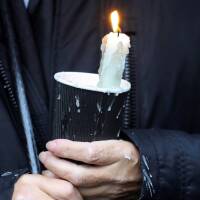Going Viral: Coronavirus Computer Game Teaches Children Social Distancing
This story was originally published May 13, 2020 by the Thomson Reuters Foundation.
A university professor has launched a computer game called "Can You Save the World?" to help children understand how social distancing can save lives during the coronavirus pandemic.
Richard Wiseman said he came up with the idea for what is thought to be the world's first COVID-19 computer game after going for a walk during lockdown in Britain and finding it "felt like a computer game" as he dodged pedestrians and cyclists.

Wiseman, a professor of psychology at the University of Hertfordshire, said research showed that games which encourage positive social behaviour can influence people's actions in the real world.
"It's a fun way of getting quite a scary message across," said Wiseman, who created the game — which has already gone viral — with designer Martin Jacob.
"There's quite a lot of research showing that if you get people — kids in particular — to behave in certain ways in video games it really does transfer to real life," he said.
The creators, who are now looking at developing an app, say governments, schools and health authorities could use the game to encourage social distancing — a key measure to keep the virus in check as countries emerge from lockdown.
"It seems to me probably more effective than some of the scary announcements we're getting because it gets in under the radar, particularly with kids," said Wiseman.
Players control an avatar through an increasingly busy street and "save lives" by avoiding pedestrians, cyclists and people sneezing — all of whom are surrounded by exclusion zones.
They can also collect masks and drop them off for health workers to save extra lives.
The aim is to save as many lives as possible. As the game progresses, the score starts accelerating to demonstrate that by protecting yourself you are protecting many others.
TOILET ROLLS
More on the impact of COVID-19 around the world
Wiseman, who is also a member of Britain's Inner Magic Circle of top magicians, said about 15,000 people had played the game since its launch on Friday.
Although conceived for children, adults are also playing and posting pictures on Twitter.
"It has gone viral. It feels like it has chimed with people," said Wiseman. "It's a way of talking about these things with kids without it being all doom and gloom."
The game has humourous touches with players also able to scoop up groceries including toilet rolls, which were in short supply at the start of lockdown as shoppers stripped supermarket shelves.
"If you're lucky enough to come across a toilet roll then you whiz through the game for a while at super speed," Wiseman said. "Toilet rolls are very rare — just like real life."
If a player bumps into someone, they lose points. Too many collisions get them "confined" and the game ends.
The highest possible score is seven billion lives saved — about the size of the world population.
The top score so far is two billion, but Wiseman confesses he is a long way off.
"For me it's about 1,000 — I'm ridiculously bad at my own game."
Reporting by Emma Batha @emmabatha; Editing by Katy Migiro.





